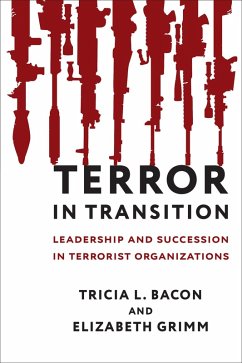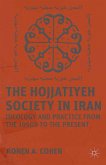What is the role of founding leaders in shaping terrorist organizations? What follows the loss of this formative leader? These questions are especially important to religious terrorist groups, in which leaders are particularly revered.
Tricia L. Bacon and Elizabeth Grimm provide a groundbreaking analysis of how religious terrorist groups manage and adapt to major shifts in leadership. They demonstrate that founders create the base from which their successors operate. Founders establish and explain the group's mission, and they determine and justify how it seeks to achieve its objectives. Bacon and Grimm argue that how successors position themselves in terms of the founder shapes a terrorist group's future course. They examine how and why different types of successors choose to pursue incremental or discontinuous change. Bacon and Grimm emphasize that the instability surrounding succession can place a group at its most vulnerable-the precise time to explore options to weaken or defeat it.
Bacon and Grimm highlight similarities between Islamic terrorist groups abroad and Christian white nationalist groups such as the 1920s Ku Klux Klan in the United States. Drawing on extensive field research in Afghanistan, Somalia, and Pakistan, Terror in Transition features detailed analysis of groups such as al-Shabaab, Egyptian Islamic Jihad, and al-Qaeda in Iraq / the Islamic State in Iraq, as well as the KKK. Offering a rigorous theoretical perspective on terrorist leadership transition, this policy-relevant book provides actionable recommendations for counterterrorism practitioners.
Tricia L. Bacon and Elizabeth Grimm provide a groundbreaking analysis of how religious terrorist groups manage and adapt to major shifts in leadership. They demonstrate that founders create the base from which their successors operate. Founders establish and explain the group's mission, and they determine and justify how it seeks to achieve its objectives. Bacon and Grimm argue that how successors position themselves in terms of the founder shapes a terrorist group's future course. They examine how and why different types of successors choose to pursue incremental or discontinuous change. Bacon and Grimm emphasize that the instability surrounding succession can place a group at its most vulnerable-the precise time to explore options to weaken or defeat it.
Bacon and Grimm highlight similarities between Islamic terrorist groups abroad and Christian white nationalist groups such as the 1920s Ku Klux Klan in the United States. Drawing on extensive field research in Afghanistan, Somalia, and Pakistan, Terror in Transition features detailed analysis of groups such as al-Shabaab, Egyptian Islamic Jihad, and al-Qaeda in Iraq / the Islamic State in Iraq, as well as the KKK. Offering a rigorous theoretical perspective on terrorist leadership transition, this policy-relevant book provides actionable recommendations for counterterrorism practitioners.
Dieser Download kann aus rechtlichen Gründen nur mit Rechnungsadresse in A, D ausgeliefert werden.









